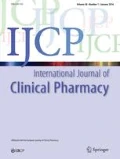Abstract
Providing appropriate pharmacotherapy to older people can be difficult since older people are more at risk of developing adverse drug reactions due to age-related physiological changes. The use of potentially inappropriate medications (PIMs) among older people is common throughout the globe, and is a cause for concern due to their clinical, humanistic and economic implications. Nevertheless, it appears that doctors and pharmacists have limited knowledge regarding PIMs. Moreover, uninformed older patients may use PIMs without considering their potential negative consequences. There is a need, therefore, to educate doctors, pharmacists and older patients about PIMs. Geriatric pharmacotherapy education with an emphasis on appropriate prescribing, and PIMs, should be included in the medical and pharmacy teachings at the undergraduate, postgraduate and continuing education levels. Moreover, older patients should be informed about PIMs and the possible risks that they may pose.
References
Hilmer SN, McLachlan AJ, Le Couteur DG. Clinical pharmacology in the geriatric patient. Fundam Clin Pharmacol. 2007;21(3):217–30.
Tinetti ME, Bogardus ST Jr, Agostini JV. Potential pitfalls of disease-specific guidelines for patients with multiple conditions. N Engl J Med. 2004;351(27):2870–4.
Dimitrow MS, Airaksinen MS, Kivelä SL, Lyles A, Leikola SN. Comparison of prescribing criteria to evaluate the appropriateness of drug treatment in individuals aged 65 and older: a systematic review. J Am Geriatr Soc. 2011;59(8):1521–30.
Hill-Taylor B, Sketris I, Hayden J, Byrne S, O’Sullivan D, Christie R. Application of the Stopp/Start criteria: a systematic review of the prevalence of potentially inappropriate prescribing in older adults, and evidence of clinical, humanistic and economic impact. J Clin Pharm Ther. 2013;38(5):360–72.
Jensen LD, Andersen O, Hallin M, Petersen J. Potentially inappropriate medication related to weakness in older acute medical patients. Int J Clin Pharm. 2014;36(3):570–80.
Frankenthal D, Lerman Y, Kalendaryev E, Lerman Y. Intervention with the screening tool of older persons potentially inappropriate prescriptions/screening tool to alert doctors to right treatment criteria in elderly residents of a chronic geriatric facility: a randomized clinical trial. J Am Geriatr Soc. 2014;62(9):1658–65.
Baldoni Ade O, Ayres LR, Martinez EZ, Dewulf Nde L, Dos Santos V, Pereira LR. Factors associated with potentially inappropriate medications use by the elderly according to Beers criteria 2003 and 2012. Int J Clin Pharm. 2014;36(2):316–24.
Cahir C, Fahey T, Teeling M, Teljeur C, Feely J, Bennett K. Potentially inappropriate prescribing and cost outcomes for older people: a national population study. Br J Clin Pharmacol. 2010;69(5):543–52.
Cahir C, Bennett K, Teljeur C, Fahey T. Potentially inappropriate prescribing and adverse health outcomes in community dwelling older patients. Br J Clin Pharmacol. 2014;77(1):201–10.
Price SD, Holman CD, Sanfilippo FM, Emery JD. Association between potentially inappropriate medications from the Beers criteria and the risk of unplanned hospitalization in elderly patients. Ann Pharmacother. 2014;48(1):6–16.
Ramaswamy R, Maio V, Diamond JJ, Talati AR, Hartmann CW, Arenson C, Roehl B. Potentially inappropriate prescribing in elderly: assessing doctor knowledge, confidence and barriers. J Eval Clin Pract. 2011;17(6):1153–9.
Maio V, Jutkowitz E, Herrera K, Abouzaid S, Negri G, Del Canale S. Appropriate medication prescribing in elderly patients: how knowledgeable are primary care physicians? A survey study in Parma. Italy J Clin Pharm Ther. 2011;36(4):468–80.
Cullinan S, Fleming A, O’Mahony D, Ryan C, O’Sullivan D, Gallagher P, Byrne S. Doctors’ perspectives on the barriers to appropriate prescribing in older hospitalized patients: a qualitative study. Br J Clin Pharmacol. 2015;79(5):860–9.
Spinewine A, Fialová D, Byrne S. The role of the pharmacist in optimizing pharmacotherapy in older people. Drugs Aging. 2012;29(6):495–510.
Zou D, Tannenbaum C. Educational needs, practice patterns and quality indicators to improve geriatric pharmacy care. Can Pharm J (Ott). 2014;147(2):110–7.
Hanlon JT, Fillenbaum GG, Ruby CM, Gray S, Bohannon A. Epidemiology of over-the-counter drug use in community dwelling elderly: United States perspective. Drugs Aging. 2001;18(2):123–31.
Damestoy N, Collin J, Lalande R. Prescribing psychotropic medication for elderly patients: some physicians’ perspectives. CMAJ. 1999;161(2):143–5.
Reeve JF, Peterson GM, Rumble RH, Jaffrey R. Programme to improve the use of drugs in older people and involve general practitioners in community education. J Clin Pharm Ther. 1999;24(4):289–97.
Tannenbaum C, Martin P, Tamblyn R, Benedetti A, Ahmed S. Reduction of inappropriate benzodiazepine prescriptions among older adults through direct patient education: the EMPOWER cluster randomized trial. JAMA Intern Med. 2014;174(6):890–8.
Martin P, Tamblyn R, Ahmed S, Benedetti A, Tannenbaum C. A consumer-targeted, pharmacist-led, educational intervention to reduce inappropriate medication use in community older adults (D-PRESCRIBE trial): study protocol for a cluster randomized controlled trial. Trials. 2015;16:266.
Funding
The author is funded by the 100th Anniversary Chulalongkorn University Fund for Doctoral Scholarship. This work was partially supported by the Research Acculturation Grant Scheme (RAGS), Malaysia (RAGS/2013/UITM/SKK02/3;SKK02/5). The funders had no role in the preparation, review and approval of the article; or in the decision to submit the manuscript for publication.
Author information
Authors and Affiliations
Corresponding author
Ethics declarations
Conflicts of interest
None.
Rights and permissions
About this article
Cite this article
Wahab, M.S.A. The relevance of educating doctors, pharmacists and older patients about potentially inappropriate medications. Int J Clin Pharm 37, 971–974 (2015). https://doi.org/10.1007/s11096-015-0203-3
Published:
Issue Date:
DOI: https://doi.org/10.1007/s11096-015-0203-3

